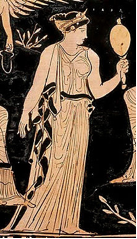The Ιmportance of Greek Mythology
We are all Athenians in a sense, for the ideas of ancient Greece have permeated our whole culture
Not only has Greek and Roman mythology furnished inspiration, exerted influence and provided subject matter for many masterpieces of poetry, prose, sculpture and painting, but its stories are interesting and entertaining in themselves, to say nothing of having provided the source of classical allusions which appear continually in editorials, addresses, lectures, advertisements, and conversations.
Scientists have found mythology a treasure chest in providing names for animals, plants, constellations, planets, and – more recently in our space age – for missiles and space vehicles like Gemini, Apollo, Mercury, and Zeus. The old myths have also been a source of inspiration for designers, engravers and other craftsmen.
A knowledge of classical mythology is indispensable in understanding and appreciating much of the great literature, sculpture and painting of both the ancients and the moderns. Unless we know the marvelous stories of the deities and heroes of the ancients, their great literature and art as well as much later work down to the present day will remain unintelligible. Through the centuries from Chaucer, Spencer, Shakespeare and Milton on, not only the major writers but also hundreds of lesser writers have retold the old tales or used them as a point of departure for new interpretations in terms of contemporary problems and psychology. Often modern writers use the old myths as symbols, though they may change the original story so much that it is not recognizable except to the really perceptive reader. An intelligent reader of much English, American and continental poetry and prose, or an attentive observer of Renaissance or modern sculpture and painting needs to be acquainted almost as much with mythology as with the world of nature and of human nature.
The Greeks based their literature, as well as their sculpture and painting, more on mythology than on any other one source, and the Romans, having little mythology of their own, used the material from Greece and changed the names to a Roman form, such as Zeus to Jupiter, Hera to Juno, Athena to Minerva, Aphrodite to Venus etc.
An English scholar H. A. Guerber has written: “The importance of classical mythology from an educational standpoint has never been more generally recognized than it is today”. Whitman said, “Great are the myths”. John Keats knew mythology almost by heart and after reading Chapman’s translation of Homer, wrote: “Much have I traveled in the realms of gold, and many goodly states and kingdoms seen”.
For the twentieth-century reader, there is still a great deal of gold in these stories. Like Odysseus and his dramatic encounters with gods and men as he sailed home from Troy to Ithaca, we too can learn much from the stories of the ancient gods and the Greek and Roman heroes, much that is applicable to our life today.












